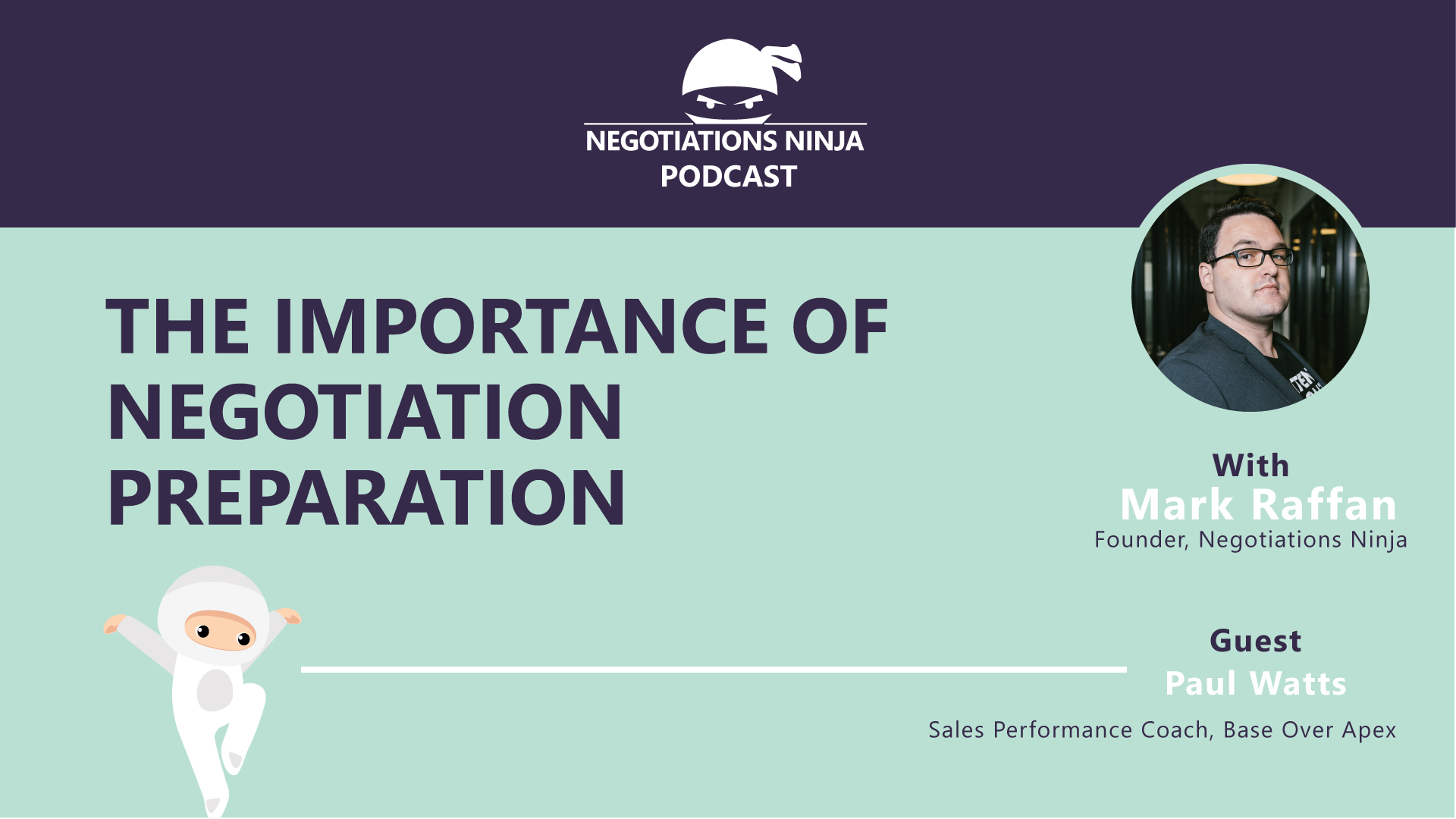Planning in negotiation is a crucial element that we may often forget the importance of. Today’s guest—Paul Watts—shares the importance of planning in negotiation. He notes that 80% of success comes from extensive planning. In this episode of Negotiations Ninja, Paul and I talk about negotiation through the lens of a salesperson, the cost of inaction, and techniques to improve your negotiation skills.
Paul Watts is a Sales Performance Coach with Base Over Apex and host of the ‘Sales Reinvented’ podcast. His mission is to change the negative perception of salespeople and make selling a profession to be proud of. His goal is to help sales professionals be more effective to be able to live life on their own terms. Listen to this episode for a deep-dive into negotiation from the perspective of someone who’s been in sales for over 20 years.
Outline of This Episode
- [3:19] Paul Watt’s background in sales and podcasting
- [4:51] Planning is the most important element of negotiation
- [7:36] Present the cost of inaction and the return on investment
- [11:11] The best way to improve your negotiation skills
- [14:37] A negotiation techniques Paul employs regularly
- [20:11] Role models and styles Paul embraces
- [21:51] What happens when a negotiation goes downhill
- [29:49] Paul advises to embrace a learning mindset
The importance of planning in negotiation
According to Paul “A salesperson really needs to be sure that they are solving their customer’s problem, that they understand their customer’s challenges, needs and objectives, and that they have put forward a solution that meets those needs, challenges, and objectives—first and foremost”.
You need to understand the financial case, cost of inaction, the client’s ROI and total costs involved. A good negotiator must also do a payback analysis, understand the cost/benefit ratio, and provide financial justification for the solution being offered. Paul notes that this takes significant upfront planning, and if you can’t perform those tasks—maybe you aren’t ready to negotiate.
Understanding the cost of inaction
A topic that Paul touches on is that of ‘the cost of inaction’ (COI). There is a lot of mathematical preparation for a negotiation, including running the financials. You must calculate the cost-risk a business makes if they decide to NOT move forward with your decision. Most salespeople and negotiators focus on the Return of the Investment (ROI) but neglect the COI.
Paul points out that it’s a mistake—you must present both the risk and the reward. You need to be able to show both sides to paint the full picture. More often than not, the risk is more compelling. The emotional impact of risk is twice as big as the impact of the potential of reward. It also increases the likelihood of the customer deciding in your favor. Keep listening as we chat about how to frame COI/ROI for a potential customer.
The ‘tripwire’ negotiation technique Paul employs
Paul always plans a tripwire into his negotiations. When you’re preparing for your negotiation, you have to know what your bottom line is—the point when you walk away without a deal being done. Paul sets a tripwire point slightly above that bottom-line position. If—during the course of a negotiation—you hit that tripwire, it’s a signal to pause the negotiation.
Paul points out that when you hit that point, you’re dangerously close to altogether losing the deal. So he typically suggests that both parties take a step back. Both parties walk away, go back to their respective organizations, and reconsider their position. Then they set up a follow-up meeting where they are each refocused. Paul believes this tactic has saved many of his negotiations from completely falling apart.
Embrace and maintain a learning mindset
Paul’s #1 piece of advice: Don’t think you’ve figured it all out. Paul was always successful and always hit his targets. It wasn’t until he started his podcast and interviewed real experts that he realized how little he actually knew. It wasn’t until he became a sales coach and was asked questions he couldn’t answer.
He learned you must embrace humility and be open to recognizing that you don’t have it all figured out. Paul shares that “There are other people whose opinions may change your opinion, that have insights that you may not necessarily have, and that have knowledge that you don’t have. So be open to learning from those people”.
Listen to the whole episode—we talk about how to improve negotiation skills and what Paul learned from a multi-million-dollar deal he almost lost. Don’t miss this key advice and insight!
Resources & People Mentioned
- Gary Vaynerchuk’s 4Ds Program
- BOOK: Thinking, Fast and Slow
- Kwame Christian
- Patrick Tinney
- Dan Shapiro
- William Urey
Connect with Paul Watts
- The Sales Reinvented Podcast
- Paul on LinkedIn
- Paul on Twitter
- Base Over Apex
Connect With Mark
- Follow Negotiations Ninja on Twitter: @NegotiationPod
- Connect with Mark on LinkedIn
- Follow Negotiations Ninja on LinkedIn
- Connect on Instagram: @NegotiationPod




